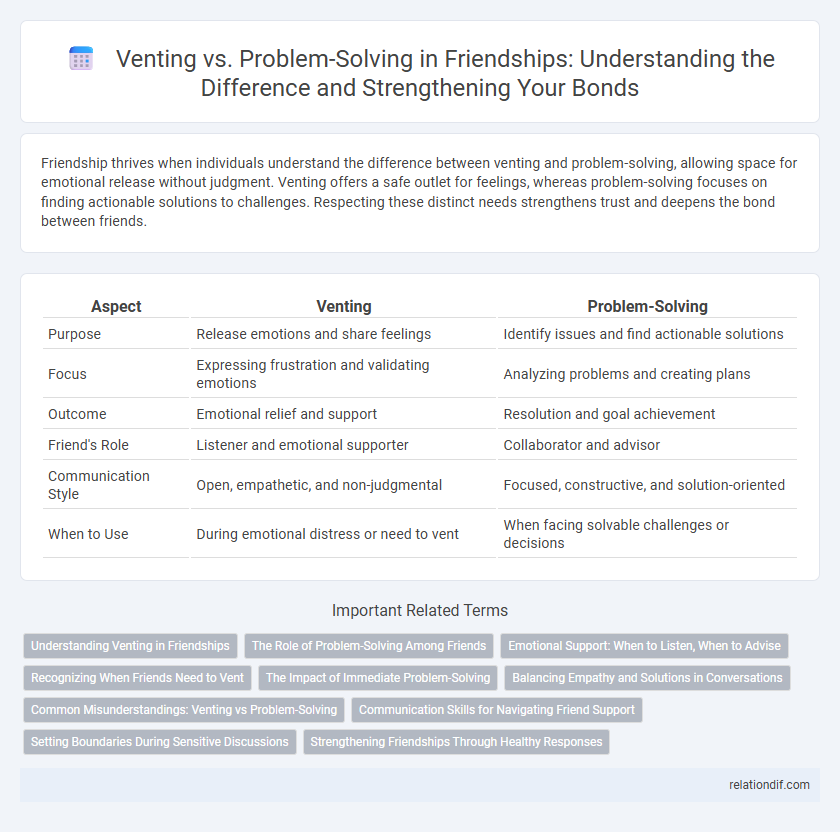Friendship thrives when individuals understand the difference between venting and problem-solving, allowing space for emotional release without judgment. Venting offers a safe outlet for feelings, whereas problem-solving focuses on finding actionable solutions to challenges. Respecting these distinct needs strengthens trust and deepens the bond between friends.
Table of Comparison
| Aspect | Venting | Problem-Solving |
|---|---|---|
| Purpose | Release emotions and share feelings | Identify issues and find actionable solutions |
| Focus | Expressing frustration and validating emotions | Analyzing problems and creating plans |
| Outcome | Emotional relief and support | Resolution and goal achievement |
| Friend's Role | Listener and emotional supporter | Collaborator and advisor |
| Communication Style | Open, empathetic, and non-judgmental | Focused, constructive, and solution-oriented |
| When to Use | During emotional distress or need to vent | When facing solvable challenges or decisions |
Understanding Venting in Friendships
Venting in friendships serves as an emotional release where individuals express feelings without seeking immediate solutions, fostering empathy and deeper connection between friends. Understanding venting means recognizing it as a way for friends to process emotions rather than a call for problem-solving advice. Respecting this distinction enhances communication and strengthens the trust integral to supportive friendships.
The Role of Problem-Solving Among Friends
Problem-solving among friends fosters mutual understanding and strengthens bonds by collaboratively addressing challenges. Engaging in solution-focused conversations enhances emotional support and promotes proactive growth within the friendship. Effective problem-solving encourages trust and resilience, making friendships more adaptable to conflicts and life changes.
Emotional Support: When to Listen, When to Advise
Effective friendship balances emotional support by discerning when to actively listen versus when to offer advice. Listening attentively validates feelings and fosters trust, essential for emotional healing and connection. Offering problem-solving guidance becomes valuable only after understanding the friend's emotional state and ensuring they are ready for constructive input.
Recognizing When Friends Need to Vent
Recognizing when friends need to vent involves observing signs of emotional distress such as sighing, tone changes, or repeated expressions of frustration without seeking solutions. Friends often use venting as a way to release stress and feel heard, valuing empathy and validation over immediate problem-solving. Respecting this need fosters trust and strengthens the friendship by creating a supportive environment where emotions can be freely expressed.
The Impact of Immediate Problem-Solving
Immediate problem-solving in friendships can sometimes overshadow emotional support, causing friends to feel unheard when they seek empathy rather than solutions. Prioritizing active listening and validating feelings before offering advice strengthens trust and deepens the bond between friends. Balancing venting with constructive problem-solving enhances communication and fosters a supportive, resilient friendship dynamic.
Balancing Empathy and Solutions in Conversations
Effective friendship conversations balance empathy and problem-solving by first validating emotions to create a safe space for venting. Active listening helps friends feel understood, while gently introducing solutions prevents overwhelming the speaker. This approach fosters trust and promotes both emotional relief and constructive progress.
Common Misunderstandings: Venting vs Problem-Solving
Venting often gets mistaken for problem-solving, but the two serve distinct emotional purposes in friendships. Venting is primarily about expressing feelings to gain empathy and relief, while problem-solving focuses on finding actionable solutions to issues. Confusing these can lead to misunderstandings, as friends may feel unheard if they seek emotional support but receive advice instead.
Communication Skills for Navigating Friend Support
Effective communication skills are crucial for navigating friend support, especially when distinguishing between venting and problem-solving. Active listening and empathetic responses help friends feel heard during venting, while clear questions and constructive feedback facilitate problem-solving conversations. Understanding and respecting these communication nuances strengthens trust and enhances the overall quality of friendship interactions.
Setting Boundaries During Sensitive Discussions
Setting boundaries during sensitive discussions strengthens trust and respect in friendships by clearly defining what topics or emotions are open for venting or problem-solving. Friends who communicate limits around when to listen empathetically versus when to offer solutions avoid misunderstandings and emotional exhaustion. Establishing these boundaries supports healthier interactions and ensures both parties feel valued and understood.
Strengthening Friendships Through Healthy Responses
Expressing feelings through venting allows friends to feel heard and validated, fostering emotional intimacy. Collaborative problem-solving promotes trust and reinforces support by encouraging constructive feedback and shared solutions. Prioritizing healthy responses in conversations strengthens friendships and builds resilience during challenging times.
Venting vs Problem-solving Infographic

 relationdif.com
relationdif.com